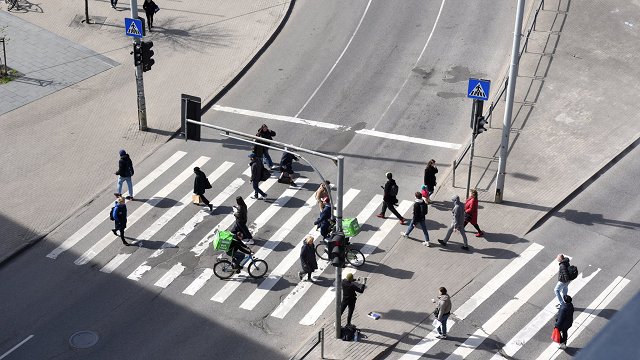The national minimum wage rose in all Baltic states in 2024, moreover in Q1 2024 its ratio to the average national earnings was similar in all three countries – 43 %.
Central Statistical Bureau (CSB) working-day and seasonally non-adjusted data published May 30 show that in Q1 2024 the gross average monthly wages and salaries for full-time work amounted to EUR 1 623 and over the year they have increased by EUR 162 or 11.0 %.
Hourly earnings before taxes went up to EUR 10.65 or by 16.0 %. Over the quarter, the gross average earnings increased by 0.8 % and hourly earnings by 1.3 %.
The net average wages and salaries (calculated based on the labor taxes applicable to employers) constituted EUR 1 180 or 72.7 % of gross earnings and over the year grew by 10.2 %, thus running ahead of inflation. The real increase in the net earnings, taking inflation into account, was 9.3 %.
The figures will have been influenced by a hike in the national minimum wage in Latvia from EUR 620 to 700 (+12.9 %) from January 1, 2024.
In Q1 2024, the gross median wages and salaries for full-time work amounted to EUR 1 293. Over the year, the gross median earnings increased by EUR 144 or 12.5 % (from EUR 1 149 in Q1 2023). The net median earnings (after taxes) were EUR 957 and over the year have risen by 11.7 %.
In the public sector the annual rise in the average earnings was 7.4 percentage points higher than in the private sector – 16.3 % and 8.9 %, respectively.
In Q1 2024, the average monthly earnings before taxes in the public sector totalled EUR 1 657 while in the private sector they were EUR 43 lower, i.e., EUR 1 614. The average earnings in general government sector, which includes central and local government institutions as well as enterprises controlled and financed by the central and local government, went up to EUR 1 606 (up by 17.6 % over the quarter). The average earnings in the public sector reduced by 0.7 % over the quarter, in general government sector by 1.6 % while in private sector rose by 1.8 %.
The state budget approved for 2024 provides for an increase in the earnings of employees working for the institutions subordinate to the Ministry of the Interior and the Ministry of Justice as well as in the health, social affairs, education and culture sectors. The remuneration reform that foresees gradual shift towards more competitive remuneration in the public administration (launched in 2022) is still ahead, too, so wages rises look likely to continue for some time.
In terms of economic activities, the sharpest rise in the average earnings was registered in education (20.4 %), followed by public administration and defence (15.8 %), accommodation and food service activities as well as other service activities (which include activities of religious, political, etc. membership organisations, repair of computers and personal and household goods, washing and (dry-)cleaning of textile and fur products, hairdressing and other beauty treatment, funeral and related activities, etc. personal service activities) (13.8 %), as well as transportation and storage (12.0 %).
In Q1 2024, the gross average monthly earnings from full-time work above the national average were recorded in financial and insurance activities (EUR 2 956), information and communication (EUR 2 675), energy sector (EUR 2 118), professional, scientific and technical activities (EUR 2 092), public administration (EUR 1 883), human health and social work activities (EUR 1 680), as well as mining and quarrying (EUR 1 666).
The lowest gross earnings from full-time work were observed in accommodation and food service activities (EUR 1 071).
As usual, wages in Rīga and its surrounding area (Pierīga) were substantially more than in the rest of the country. However, in Q1 2024, compared to Q1 2023, the sharpest rise in the average earnings before taxes was observed in Latgale (12.5 %), followed by Vidzeme (11.6 %) and Zemgale (11.2 %).
The highest gross average earnings from full-time work were recorded in Rīga (EUR 1 804) while the lowest in Latgale (EUR 1 151, which is 36 % less than in the capital). The gap between the average earnings in Rīga and the regions has narrowed in all regions, except for Kurzeme. The largest drop (of 1.0 percentage points) was observed in Latgale.





























